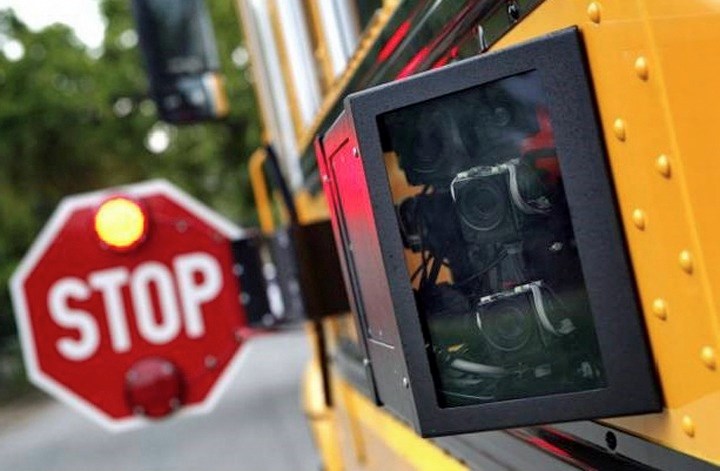THUNDER BAY — Efforts to arm local school buses with cameras to catch dangerous drivers have run into a stop sign, with a City of Thunder Bay staff report saying the step is “not feasible” without more provincial support.
Though the province enabled municipalities to approve stop arm camera programs in 2020, the government hasn’t ensured centralized ticket processing is available, as it is for similar programs like red light cameras.
That has kneecapped municipalities’ ability to implement the cameras, staff found in a report that will be considered by council on Dec. 5, noting only Ottawa is “fully participating” so far.
Craig Murphy, head of the consortium that coordinates busing for all three local school boards, said he’s increasingly concerned students will get hurt while governments wrangle over how to tackle the problem.
School bus drivers with the Student Transportation Services of Thunder Bay (STSTB) have tracked 471 vehicles illegally passing stopped school buses while students were getting on or off so far this school year through a voluntary reporting program, he said.
That works out to just over eight instances a day, while Murphy believes others go unreported.
“Unfortunately, what we see quite often is many motorists ignoring the law that requires them to stop,” he said. “We’ve been very fortunate that we haven’t had a serious incident, but it’s only a matter of time.”
He called stop arm cameras a “great tool” that’s proven effective south of the border.
“We’ll certainly not stop our push to get them on the buses, and hopefully we’ll get there before tragedy strikes,” he said.
City police have previously put GoPro cameras on school buses, but that evidence would not be admissible in court.
Coun. Kristen Oliver (Westfort), who has championed stop arm cameras at city hall, said she’s deeply disappointed but accepts the conclusions of city staff.
She intends to move a motion at Monday’s council meeting to lobby the province on the issue.
“I think administration really did try to cover off every opportunity they could to see this move forward,” she said. “What I find really frustrating is the province … [is] not working collaboratively to have a processing centre implemented so we can see this come to fruition.”
However, Oliver added it’s a problem governments shouldn’t have to address in the first place.
“Quite frankly, I find it incredibly disappointing and shameful that drivers are that reckless that they’re blowing around stopped school buses,” she said. “It’s infuriating to me that we have to look at doing enforcement to break those poor driving habits.
“But until people start to realize they’re putting children’s lives in jeopardy because they can’t wait that extra two minutes behind a school bus, we have to look at every opportunity we can to change that behaviour.”
Murphy said camera programs have significantly reduced violations in jurisdictions in the United States, where third-party operators typically install and maintain cameras and collect data, sending suspected violations to police to confirm.
In Ontario, third-party vendors aren’t authorized by the Ministry of Transportation to access vehicle registration information, putting more of the burden on police forces.
“That is something that has been promised by the [provincial] government for some time now, but it’s not in place,” said Murphy.
City staff pointed to the fact that Ontario’s Joint Processing Centre, which handles back-end work for other automatic enforcement programs like red light cameras, won’t accept stop arm evidence as the biggest obstacle.
“At this time, it is not feasible for the City of Thunder Bay to enter the program due to the lack of a provincial evidence processing centre, and significant resources needed, including police resources, to set up a processing centre in Thunder Bay,” staff found.
That would include purchasing specialized software, modifying existing ticketing programs, and dedicating additional police officer hours to reviewing evidence and preparing documentation, the city said.
Murphy said he understands that rationale, while noting the report didn’t estimate how much it would actually cost the city to implement stop arm cameras.
He holds out some hope council could choose to make the program a priority.
“Like everything else, it requires funding, and the city has only so many tax dollars available to them, and they’ve got to decide what’s most important,” he said. “From my point of view, protecting the safety of the children in our community is a pretty high priority.”
Anyone can report a vehicle passing a stopped school bus to police, Murphy said, but it can be difficult to gather enough information to secure a conviction, particularly for school bus drivers who are occupied monitoring children.
“If police decide the information given to them is sufficient to give a ticket, it’s the school bus driver’s word against the vehicle driver’s word,” he said. “And if they go to court, they have to give eyewitness testimony, and unfortunately it’s not always successful. This is why stop arm cameras are so important.”
Those who are convicted of failing to stop for a school bus when it has its red lights flashing are subject to a minimum fine of $490 and six demerit points.
